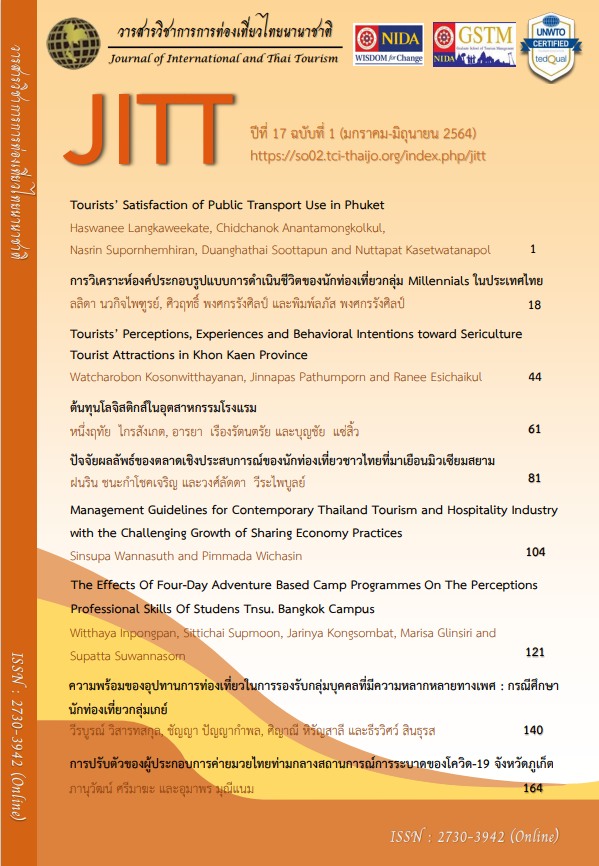ปัจจัยเชิงผลลัพธ์ตลาดเชิงประสบการณ์ของนักท่องเที่ยวชาวไทยที่มาเยือน พิพิธภัณฑ์มิวเซียมสยาม
Main Article Content
บทคัดย่อ
การศึกษานี้เป็นการนำแนวคิดการตลาดเชิงประสบการณ์มาประยุกต์ใช้ด้านอุตสาหกรรมการท่องเที่ยว มีวัตถุประสงค์เพื่อ 1) ศึกษาระดับตัวแปรตลาดเชิงประสบการณ์ ความพึงพอใจ การแนะนำต่อและการกลับมาเที่ยวซ้ำ 2) ศึกษาอิทธิพลของตลาดเชิงประสบการณ์ที่ส่งผลต่อความพึงพอใจ การแนะนำต่อและการกลับมาเที่ยวซ้ำ และ3) ศึกษาอิทธิพลของความพึงพอใจที่ส่งผลต่อการแนะนำต่อและการกลับมาเที่ยวซ้ำของนักท่องเที่ยวชาวไทยที่มาเยือนพิพิธภัณฑ์มิวเซียมสยาม การศึกษานี้เป็นงานวิจัยเชิงปริมาณมีเครื่องมือวิจัยคือแบบสอบถาม โดยกลุ่มตัวอย่างเป็นนักท่องเที่ยวชาวไทยที่มาเข้าชมพิพิธภัณฑ์มิวเซียมสยาม จำนวน 399 ตัวอย่าง การวิเคราะห์ข้อมูลเป็นการใช้สถิติเชิงพรรณา การวิเคราะห์ค่าสัมประสิทธิ์เพียร์สันและการถดถอยพหุคูณ ผลการศึกษาพบว่า ทุกระดับตัวแปรอยู่ในภาพรวมที่มีค่าเฉลี่ยระดับมาก และผลการวิเคราะห์การทดสอบสมมติฐานได้มีการยอมรับสมมติฐานทั้ง 5 สมมติฐาน ผลการศึกษานี้สามารถเป็นข้อมูลให้ทางฝ่ายการตลาดสามารถนำไปใช้บริหารจัดการพัฒนาด้านกลยุทธ์การตลาดเพื่อรองรับนักท่องเที่ยวในอนาคต
Article Details
เอกสารอ้างอิง
Investigating the impact of tourist satisfaction and intention to revisit: A Chiang Mai,
Thailand case study. Asia Pacific Journal of Tourism Research, 23(11), 1098-1114.
Brakus, J. J., Schmitt, B. H., & Zarantonello, L. (2009). Brand experience: what is it? How is it
measured? Does it affect loyalty?. Journal of marketing, 73(3), 52-68.
Brandbuffet. (2561). จุดกระแส Share ให้ปังกลยุทธ์ปากต่อปากแบบ4.0 สร้างได้ด้วยMomentum Marketing. Retrieved from https://today.line.me/th/pc/article.
Chen, J. S., & Gursoy. (2001). An Investigation of Tourists’ Destination Loyalty and Preferences. International Journal of Contemporary Hospitality Management, 13(2), 79-85.
Coudounaris, D. N., & Sthapit, E. (2017). Antecedents of memorable tourism experience related to behavioral intentions. Psychology & Marketing, 34(12), 1084-1093.
eTAT Tourism Journal (2555). Retrieved from TAT Review Magazine - ไตรมาสที่ 2/2555 เมษายน-มิถุนายน (etatjournal.com)
Hallmann, K., & Breuer, B. Z. (2010). The Impact of Image Congruence between Sport Event and Destination on Behavioral Intention. Tourism Review, 65(1), 66-74.
Hair, J. F., Black, W. C., Babin, B. J., & Anderson, R. E. (2010). Multivariate Data Analysis (7th ed.) New Jersey: Prentice Hall.
Hellier, P. K., Geursen, G. M., Carr, R. A., & Rickard, J. A. (2003). Customer repurchase intention. European journal of marketing.
Kwortnik, R. J. & Ross. W .T. (2007). “The Role of Positive Emotions in Experiential Decisions,” International Journal of Research in Marketing, 24, 324-335
Lake, L. (2019, June 25). Word of Mouth vs. Viral Marketing: What's the Difference?
Retrieved April 25, 2015, from About.com:
http://marketing.about.com/od/marketingmethods/a/womvsviral.htm
Lee, T. H., & Chang, Y. S. (2012). The influence of experiential marketing and activity involvement on the loyalty intentions of wine tourists in Taiwan. Leisure Studies, 31(1), 103-121.
Lin, M. T. Y. (2019). Effects of Experiential Marketing on Experience Value and Customer
Satisfaction in Ecotourism. Ekoloji Dergisi, (107).
Moon, S. A., & Byun, G. I. (2016). Research on the effect of experiential elements on brand
attitude, visitor's satisfaction, revisit intention-Focusing on regional product festival. Culinary science and hospitality research, 22(2), 189-205.
Schmitt, B.H. (1999) Experiential Marketing. Journal of Marketing Management, 15, 53-67.
Schmitt, B. H., & Rogers, D. L. (2008). Handbook on Brand and Experience Management. Edward Elgar.
Tsaur, S. H., Chiu, Y. T., & Wang, C. H. (2007). The visitors behavioral consequences of experiential marketing: An empirical study on Taipei Zoo. Journal of Travel & Tourism Marketing, 21(1), 47-64.
Vesci, M., Conti, E., Rossato, C., & Castellani, P. (2020). The mediating role of visitor satisfaction in the relationship between museum experience and word of mouth: evidence from Italy. The TQM Journal.
William, C. S. (1966). Interpersonal Needs Theory. Chicago: Illinois.
Wu, H. C., Li, M. Y., & Li, T. (2018). A study of experiential quality, experiential value,
experiential satisfaction, theme park image, and revisit intention. Journal of
Hospitality & Tourism Research, 42(1), 26-73.
Yeh, T. M., Chen, S. H., & Chen, T. F. (2019). The relationships among experiential marketing,
service innovation, and customer satisfaction—A case study of tourism factories in
Taiwan. Sustainability, 11(4), 1041.


